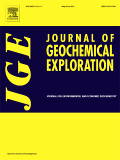
JOURNAL OF GEOCHEMICAL EXPLORATION
Scope & Guideline
Advancing Insights in Geochemistry and Economic Geology
Introduction
Aims and Scopes
- Mineral Exploration Geochemistry:
Focuses on the geochemical characteristics and processes of mineral deposits, including the identification and assessment of mineral resources through geochemical data analysis. - Environmental Geochemistry:
Investigates the impact of geochemical processes on environmental health, including studies on soil contamination, groundwater quality, and the effects of mining activities. - Geochemical Mapping and Modeling:
Utilizes advanced geochemical mapping techniques and modeling approaches to delineate mineralization patterns and assess resource potential in various geological settings. - Analytical Techniques in Geochemistry:
Highlights the development and application of cutting-edge analytical methods, such as isotopic analysis and spectroscopy, to improve mineral exploration and environmental assessments. - Sustainable Resource Management:
Explores innovative strategies for sustainable mining practices and the recovery of critical minerals, emphasizing the importance of environmental stewardship in mineral exploration.
Trending and Emerging
- Machine Learning and Data Analytics in Geochemistry:
There is a growing trend towards integrating machine learning techniques and data analytics in geochemical exploration, enhancing the ability to predict mineralization and identify geochemical anomalies. - Hydrogeochemistry and Water Quality Assessment:
Research focusing on hydrogeochemical processes and the assessment of water quality in mining-affected areas is gaining prominence, highlighting the importance of understanding water-mineral interactions. - Critical Minerals and Resource Recovery:
An increasing emphasis on the exploration and recovery of critical minerals, including rare earth elements, reflects the global demand for sustainable practices and resource management. - Interdisciplinary Approaches to Geochemical Studies:
There is a noticeable trend towards interdisciplinary research that combines geochemistry with environmental science, biology, and technology, fostering innovative solutions to complex geological challenges. - Geochemical Signatures and Environmental Monitoring:
Emerging studies are focusing on the use of geochemical signatures for environmental monitoring, particularly in assessing the impacts of pollution and mining activities on ecosystems.
Declining or Waning
- Traditional Geochemical Assays:
The reliance on conventional geochemical assays for mineral exploration is decreasing as more sophisticated analytical techniques and data-driven approaches gain traction. - Static Geochemical Models:
There is a noticeable decline in static geochemical modeling approaches, with a shift towards dynamic and machine learning-based models that can better accommodate the complexities of geochemical systems. - Generalized Soil Contamination Studies:
General studies on soil contamination without specific focus on the geochemical processes or remediation techniques are becoming less common, as research increasingly prioritizes targeted investigations and innovative solutions.
Similar Journals
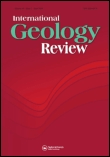
INTERNATIONAL GEOLOGY REVIEW
Pioneering insights into the dynamic world of geology.INTERNATIONAL GEOLOGY REVIEW, published by Taylor & Francis Inc, is a premier journal dedicated to advancing the field of geology since its inception in 1959. With its Q1 ranking in the field of Geology for 2023, this journal is a significant platform for researchers, professionals, and students exploring the intricacies of Earth and planetary sciences. The journal has been rated in the 81st percentile within Scopus rankings, reflecting its influence and the high quality of articles published. Although it does not offer Open Access options, the journal maintains a rigorous peer-review process to ensure the publication of original and impactful research. With an extensive archive projected to continue until 2024, INTERNATIONAL GEOLOGY REVIEW serves as an essential resource for those seeking to deepen their understanding of geological phenomena, making it a vital contributor to the global scientific community.
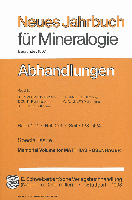
NEUES JAHRBUCH FUR MINERALOGIE-ABHANDLUNGEN
Illuminating the path of mineralogical discovery.NEUES JAHRBUCH FUR MINERALOGIE-ABHANDLUNGEN, published by E Schweizerbart'sche Verlagsbuchhandlung in Germany, is a distinguished scholarly journal dedicated to advancing the fields of mineralogy and petrology. With an ISSN of 0077-7757, it provides a platform for researchers to disseminate high-quality findings that contribute to our understanding of Earth sciences. Although it currently has no open access options, the journal remains vital for professionals seeking to engage with impactful research in geochemistry and petrology, as reflected in its 2023 Scopus ranking in the 21st percentile within its category. The journal has documented significant research from 1980 to 1988 and resumed from 1996 to 2023, making it a crucial archive for historical and contemporary studies. Despite its current Q4 quartile ranking, NEUES JAHRBUCH FUR MINERALOGIE-ABHANDLUNGEN is an important contributor to the academic discourse in its field, and it invites researchers, professionals, and students alike to explore and submit their work that drives innovation and understanding in mineralogical studies.

Periodico di Mineralogia
Illuminating Earth Processes Through Rigorous ResearchPeriodico di Mineralogia, published by SAPIENZA UNIV EDITRICE, is a distinguished academic journal based in Italy that has been pivotal in advancing the fields of Geochemistry, Geology, and Geophysics since its inception in 1979. With an ISSN of 0369-8963 and an E-ISSN of 2239-1002, the journal boasts a solid reputation reflected in its Q3 category rankings across these disciplines as per 2023 metrics. The journal’s scope encompasses a broad range of topics related to mineralogy and earth sciences, providing a vital platform for researchers, professionals, and students to disseminate their findings. Despite the absence of an Open Access option, Periodico di Mineralogia remains an essential resource for the dissemination of high-quality research that contributes to our understanding of earth processes and materials. Situated in the heart of Rome at PIAZZALE ALDO MORO 5, it serves as a crucial bridge between academic research and practical applications in geology and planetary sciences.
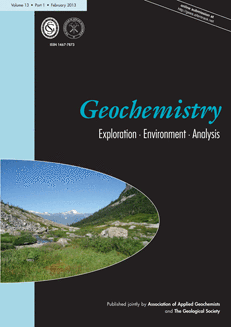
GEOCHEMISTRY-EXPLORATION ENVIRONMENT ANALYSIS
Pioneering research at the intersection of geochemistry and ecology.GEOCHEMISTRY-EXPLORATION ENVIRONMENT ANALYSIS, published by the esteemed Geological Society Publishing House, is a leading journal in the fields of geochemistry, environmental science, and Earth and planetary sciences. With an ISSN of 1467-7873 and E-ISSN of 2041-4943, this journal has established itself as a valuable resource for scholars and professionals since its inception in 2001. The journal currently holds a Q3 quartile ranking in several categories, highlighting its relevance and impact within interdisciplinary research landscapes. Covering a broad scope of topics ranging from geochemical explorations to environmental assessments, GEOCHEMISTRY-EXPLORATION ENVIRONMENT ANALYSIS serves as a platform for innovative research and critical analysis, contributing significantly to advancing knowledge in the context of ongoing global environmental challenges. Researchers looking for a credible outlet to disseminate their findings will find this journal particularly appealing, as it encourages submissions that explore novel methodologies and interdisciplinary approaches. Although the journal follows a subscription-based access model, it provides valuable insights that can enhance academic discourse and foster collaboration among experts in the field.
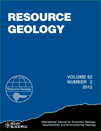
RESOURCE GEOLOGY
Connecting Geology with Resource InsightRESOURCE GEOLOGY, published by WILEY, is a peer-reviewed journal that serves as a vital platform for the dissemination of innovative research in the fields of geology and geochemistry. With an ISSN of 1344-1698 and e-ISSN 1751-3928, the journal has steadily contributed to the academic community since its inception in 1996, continuing through its planned convergence in 2024. With a Q3 ranking in both Geochemistry and Petrology and Geology categories, RESOURCE GEOLOGY is positioned within the competitive landscape of Earth and Planetary Sciences, ranked 164th and 93rd in its respective categories on Scopus, reflecting its significant contribution to the body of knowledge in these fields. While not an open-access journal, it provides access to essential research that advances our understanding of natural resources and geological processes. The journal is dedicated to publishing high-quality articles that appeal to researchers, professionals, and students looking to deepen their insight into the intricate interplay between geological phenomena and resource management.
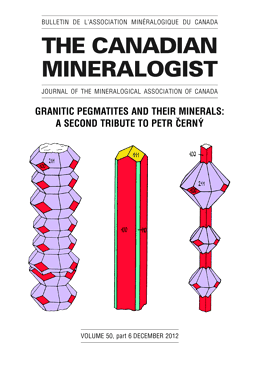
CANADIAN MINERALOGIST
Unveiling the Mysteries of Earth’s MineralsCANADIAN MINERALOGIST is a prestigious academic journal published by the Mineralogical Association of Canada, primarily focusing on the fields of Geochemistry and Petrology. Established in 1980, this journal has fostered a rich tradition of scholarly communication, offering a platform for researchers from around the world to share significant advancements and findings related to mineral science. With an impact factor that reflects its relevance within the scientific community, the journal occupies a notable position, ranked in the Q3 quartile within its category according to the 2023 assessments. The E-ISSN 1499-1276 ensures that online access is readily available, making it easier for readers to engage with cutting-edge research. With its headquarters in Quebec, Canada, CANADIAN MINERALOGIST not only contributes to the academic landscape in North America but also plays a vital role globally in advancing the understanding of mineralogy. Its commitment to high-quality publishing supports both the dissemination of knowledge and the nurturing of a vibrant scientific community.
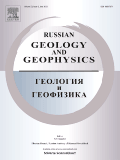
Russian Geology and Geophysics
Navigating the Complexities of Earth's SystemsRussian Geology and Geophysics is a seminal journal published by GEOSCIENCEWORLD that plays a pivotal role in the dissemination of vital research within the realms of Earth-Surface Processes, Geology, and Geophysics. With an ISSN of 1068-7971 and an E-ISSN of 1878-030X, this journal has witnessed a continuous evolution since its convergence in 2007 and is poised to thrive through 2024. While it is not an Open Access journal, it is recognized for its significant contributions to the academic community, holding a respectable Q2 ranking in Earth-Surface Processes and Q3 rankings in both Geology and Geophysics as of 2023. The journal’s impact factors align it within competitive quartiles, marking it as an essential resource for researchers and professionals seeking to stay at the forefront of geological and geophysical sciences. By publishing high-quality peer-reviewed articles, the journal fosters an environment of knowledge sharing and innovation, making it indispensable for students, practitioners, and scholars alike who are dedicated to advancing our understanding of Earth's complex systems.

Geochemical Perspectives Letters
Connecting researchers through groundbreaking geochemical research.Geochemical Perspectives Letters, published by the European Association of Geochemistry, is a leading open-access journal that has been at the forefront of geochemical research since its inception in 2015. Based in France, this journal is dedicated to disseminating high-quality, original research and reviews across the fields of Environmental Chemistry, Geochemistry, and Petrology, and Geology. With an impressive Q1 ranking in multiple categories, and notable Scopus rankings placing it among the top-tier journals in Earth Sciences, Geochemical Perspectives Letters aims to foster scientific dialogue and collaboration among researchers and professionals. Its open-access model ensures widespread dissemination of knowledge, making it accessible to a diverse audience, including students and seasoned experts alike. As the journal continues to converge research insights from 2015 to 2024, it remains a pivotal resource for those striving to understand and address the complexities of our planet's geochemical processes.

Russian Journal of Pacific Geology
Fostering Innovation in Earth and Planetary SciencesThe Russian Journal of Pacific Geology is a pivotal resource in the realm of Earth sciences, published by PLEIADES PUBLISHING INC. With an ISSN of 1819-7140 and an E-ISSN of 1819-7159, this journal has established itself as a significant publication for researchers, professionals, and students who explore the intricate geology of the Pacific region. Covering a wide array of topics including Geochemistry, Petrology, Geology, Geophysics, Oceanography, Paleontology, and Stratigraphy, the journal's relevance is underscored by its categorization within Q3 quartile rankings across multiple disciplines in the 2023 metrics. Operating from the United States, its influential publications span from 2007 to 2024, attracting a diverse audience dedicated to advancing the geological sciences. Although not an open access journal, it serves as a valuable repository of knowledge, presenting original research, reviews, and critical discussions that enhance scholarly discourse. The journal is recognized within the global scientific community, addressing significant geological challenges while fostering collaboration and innovation among scholars in the Earth and Planetary Sciences.

Minerals
Illuminating the path of geological discovery and technology.Minerals, an esteemed open-access journal published by MDPI, has been at the forefront of advancing knowledge in the fields of geology, geotechnical engineering, and engineering geology since its inception in 2011. With an E-ISSN of 2075-163X, this journal aims to foster innovative research and disseminate critical findings that influence both academia and industry practices. Based in Switzerland, Minerals has made significant strides in its impact, evidenced by its 2023 Scopus rankings placing it in the 74th percentile in Geology and 63rd percentile in Geotechnical Engineering. The journal, which will continue to publish until 2024, encourages submissions that explore the multifaceted aspects of mineral sciences, highlighting the importance of sustainable practices and advancements in technology. Researchers, professionals, and students are invited to engage with this vital resource, which not only contributes to the expansion of geological knowledge but also supports the global understanding of mineral resources.